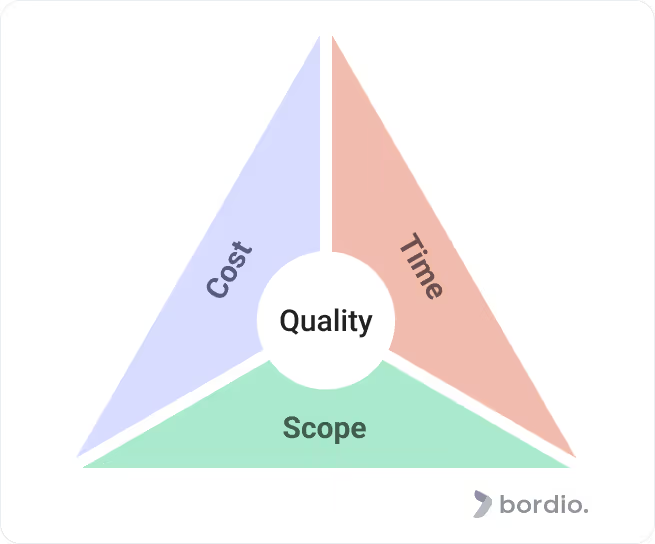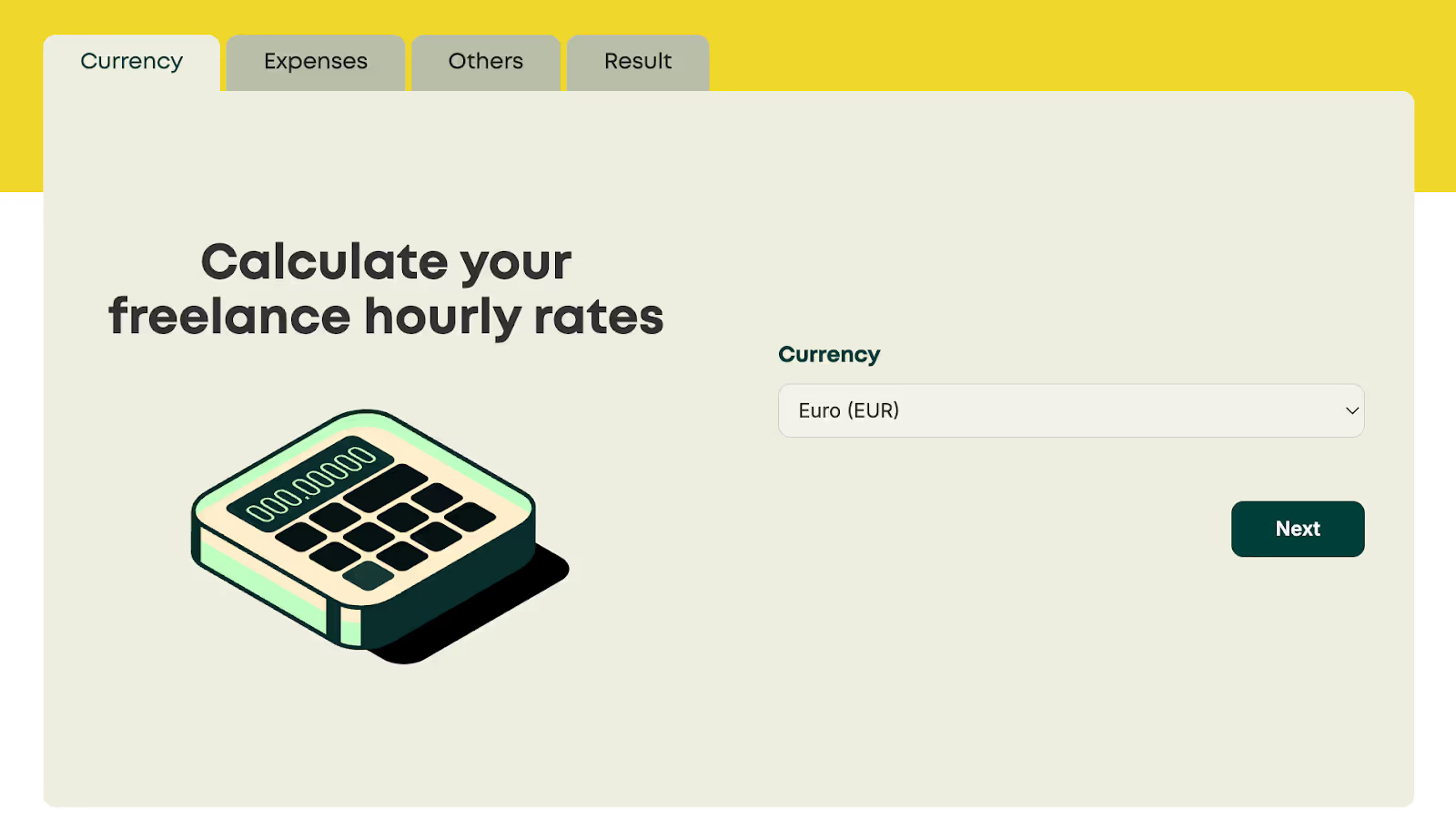Freelancers invest in developing their skills more than ever.
This investment pays back by helping you
- find new clients,
- make clients loyal,
- facilitate the workflows and processes.
89% of freelancers agree that clients want to work with independent professionals who have specialized skills and expertise.
After improving their freelancing skills
- 62% of freelancers began to feel more confident,
- 55% felt more satisfied, and
- 50% felt more productive.
(source)
Well, which skills are we talking about?
I will share 12 top freelance skills that will truly increase your income, effectiveness, and confidence.
If you're ready, let's get started!
1) Pipeline Health & Outcome-Based Selling
No client, no career. Yet, 73% of freelancers struggle to find new clients. The most foundational skill is shifting your mindset from "getting jobs" to managing a core, repeatable business process.
What this skill really is
It is the ability to maintain a healthy pipeline of potential work and to shape your services around the tangible outcomes you deliver. A client doesn't pay for 10 hours of work. They pay for a website that converts visitors into customers.
How to master it (3 key actions)
- Define your ideal client profile (ICP): Stop chasing all work. Clearly define the niche and client type you serve best, and structure your portfolio and outreach to speak directly to their pain points.
- Make outcome-based offers: Anchor your price to the transformation you provide. A client pays for conversions or clarity, not 15 hours of copywriting.
- Implement follow-up discipline: Use a lightweight CRM (like Notion or HubSpot) to track every potential lead. Sporadic outreach is a common killer of pipeline health.
The essential toolkit for growth
You don't need a huge, expensive tech stack to professionalize your client acquisition. Start simple and scalable:
- Lightweight CRM: Stop managing leads in spreadsheets. Tools like HubSpot's free tier or even a structured Notion board help you track where every lead is in the sales process. You can even use Sheets to start. If you like templates, here is a simple but practical follow-up template: Client Follow-Up System Template for freelancers
- Calendar Scheduler: Eliminate the back-and-forth of "when are you free?" with a tool like Calendly or Acuity. It instantly makes you look more professional.
- Email Sequencing: For disciplined, automated follow-up, explore simple tools like Apollo or GMass to keep warm leads from going cold.
- Proposal Tools: Deliver sharp, visually clean proposals using Canva or even well-formatted Google Docs.
- Simple Portfolio Site: You need a single, clean link that showcases your best work. Ruul Space is designed for exactly this. A professional portfolio that takes five minutes to set up.
Here is a designer’s portfolio on Ruul Space. See how a visitor can view all the important information on one page, where they can easily navigate to discover more.
That page is definitely powerful.

Have you seen the button saying “Pay Miles Becker”?
This helps clients make faster purchase decisions. They can just click and buy your service. Clients love easy processes when working with freelancers.
They can choose you just because you’re good at introducing your skills and facilitating the payment processes.
Discover Ruul Space’s sample portfolio to learn about all the details.
Avoid this fatal mistake
Selling hours instead of outcomes. This anchors your value to time, capping your earning potential and making you seem interchangeable.
2) Negotiation & Pricing Psychology
Inadequate negotiation is responsible for losing 82% of "winnable" deals.
That means mastering negotiation can bring you a lot of winning deals.
You don’t need to demand the highest price to be a good negotiator. Instead, focus on structuring an agreement that both parties respect.
What this skill really is
The capacity to set terms that ensure a profitable, respectful, and sustainable relationship.
This requires balancing the triple constraint—Cost, Time, and Scope—to deliver optimal project quality.

How to master it (3 key actions
- Anchor with options: Present your pricing using 3-tier offers (e.g., small, medium, large) to anchor the client's perception to value and move them away from debating a single number.
- Concede scope, not price: Only grant a price reduction if the client agrees to reduce the project scope, timeline, or risk. Never negotiate against yourself by just lowering your rate.
- Prepare your BATNA: Always know your Best Alternative to a Negotiated Agreement (BATNA). This confidence is your leverage to walk away from unsustainable deals.
If the topic interests you, see BATNA Basics: Boost Your Power at the Bargaining Table from Harvard.
Plus: Use a free hourly rate calculator (like Ruul's, which calculates based on expenses and taxes) to establish a personalized minimum rate. You can adjust it based on market demand, but you will always have a baseline rooted in reality.

Avoid this fatal mistake
Discounting without a scope change. You signal that your price is arbitrary, eroding the perceived value of your expertise immediately.
3) Communication & Storytelling with Evidence
Clients remember about 70% of information when it’s told as a story, while plain facts stick only around 5−10%. This makes storytelling a high-leverage skill for delivering updates and presenting case studies.
What this skill really is
Packaging your work so every stakeholder can immediately grasp the essentials.
Professional communication follows the pipeline:
Context → Finding → So-What → Now-What
This structure cuts through complexity to deliver immediate insight and action.
How to master it (3 key actions)
- Prioritize action and insight: Never send a "wall-of-text" update. Use strong headlines, visuals, and lead with your key recommendation before the supporting data.
- Use narrative arcs: Tailor the story of your findings to the audience. A marketing manager needs a different framing than a CFO.
- End with a concrete decision: Every update or presentation should end with a specific, clear Call-to-Action (CTA) or decision request, preventing stalled projects.
The essential toolkit for clarity
Professional communication relies on a clear and structured approach. And these tools can help you have it:
- Google Docs/Notion: These tools are your home base for organized, linkable updates and structured reports. Use headings, bullet points, and highlight features liberally.
- Slides/Keynote: For high-stakes presentations, keep your visuals clean and focus on one core idea per slide. Slides should support your story, not be the story.
- Loom: Use this for quick, personalized video updates or walk-throughs of deliverables. A short video often saves a long, confusing email.
- Grammar Assistants (like Grammarly): Eliminate errors that undermine your professional polish.
- Meeting Note Templates: Standardize your note-taking to include an "Action Items" and "Key Decisions" section at the top.
Avoid this fatal mistake
Burying the recommendation or insight. The client should know the key takeaway within the first three sentences, not after five paragraphs of process.
4) AI and Automation for 40% Higher Earnings
There is no other high-demand freelance skill that can increase your income as quickly as this right now. Freelancers who use AI tools save 8.1 hours per week (equivalent to a full day off) and earn 40% more than freelancers who don't.
What this skill really is
The strategic use of modern AI tools and automated workflows to reduce manual, repetitive work while maintaining strict quality and ethical standards. It’s not about replacing yourself; it’s about making your time vastly more valuable.
How to master it (3 key actions)
- Master prompt design: Learn how to design and evaluate prompts to get repeatable, high-quality output, using checklists for human-in-the-loop QA.
- Automate broken processes: First, map your workflow. Only automate simple, repetitive tasks. Never try to automate a process that is already broken.
- Utilize AI for innovation: Design small-scale trials to explore new AI-assisted approaches to work (e.g., using AI for drafting client emails or structuring data).
Avoid this fatal mistake
Automating a broken process. Garbage in, garbage out—only faster and at a greater scale.
5) Project Execution & Reliability
Employees spend 53% of their time on "work about work." Clients hire freelancers to avoid that waste. Reliability in project execution is as important as the quality of the work itself.
Managing a project is one of the best freelancing skills, as important as completing it.
What this skill really is
The ability to deliver predictably with visible progress and a tightly controlled scope. It’s about creating a structure that allows the client to feel safe, informed, and confident that the end result will arrive on time and as promised.
How to master it (3 key actions)
- Visible status rhythms: Schedule clear status updates and milestones. Use tools like Trello or Asana to give the client read-only visibility into your progress.
- Define leadership without authority: In a collaborative project, use a framework like DACI/RACI to define who is Responsible, Accountable, Consulted, and Informed for every major task.
- Implement change control: Use a formal process for handling scope creep. Document all changes and ensure new requests lead to an updated timeline or price (referencing Skill #2).
Avoid this fatal mistake
Big-bang deliveries. Dropping a massive, final deliverable without intermediate checkpoints, buffer, or risk logs.
6) Problem Framing & Decision-Making
Most clients won’t come to you with crystal-clear requests. Instead, they’ll say things like, “Can you fix this?” or “We need something like this…” If you don’t clarify these requests early on, your project has a 37% chance of failing simply because of unclear goals.
On top of that, 51% of project budgets are wasted due to poorly defined or mismanaged requirements. And that’s a double hit. You risk damaging your reputation while your client ends up wasting money without getting results.
What this skill really is
The discipline of converting a vague client "ask" into a clear decision by defining the owner, the options, the criteria for success, and the deadline. It’s the framework that ensures the client invests time and money in solving the root cause.
How to master it (3 key actions)
- Clarify goal and constraints: Before starting, verify the true goal ("Increase conversion by 10%") and the absolute constraints (budget, technology, timeline).
- Generate options creatively: Use divergent thinking techniques like SCAMPER (a creative brainstorming tool) to avoid jumping to the first obvious solution.
- Avoid gold-plating: Every solution must be tied back to the acceptance criteria. Focus on the maximum value for the minimum viable effort.
Avoid this fatal mistake
Solving the loudest problem. Often, the most urgent or easiest-to-solve problem isn't the root cause of the client's business pain.
7) Finance & Ops Hygiene
74% of freelancers don’t get paid on time. And 62% say that at some point in their career, a client has outright refused to pay. If freelancing is your main source of income, you can imagine how tough it is to survive under those conditions.
And as your income grows, so do your invoicing and tax responsibilities:
- issuing invoices,
- calculating VAT (especially for global clients), and
- declaring your earnings.
What this skill really is
The disciplined practice of maintaining clear pricing, predictable cash flow, and reliable financial routines to ensure business continuity and minimize compliance risk. Simply put: it’s keeping the money flowing and the tax authorities happy.
How to master it (3 key actions)
- Master invoicing rhythm: Send invoices immediately upon milestone completion. Use tools like Ruul (a MoR platform) to handle global tax and VAT compliance seamlessly.
- Forecast and maintain runway: Use a simple spreadsheet to track your cash-flow forecast. Know your financial runway (how many months you can survive without new income).
- Keep business and personal separate: Use dedicated accounts and expense capture apps to simplify tax time and avoid mixing personal and business funds.
Use MoR platforms for invoicing and payment
With Ruul, a MoR platform, you can improve your financial and operational hygiene.

With Ruul, you can:
- issue VAT-compliant invoices,
- work with clients from 190 countries,
- get paid in 140 currencies within a day,
- and even receive instant payments in crypto.
Ruul also lets you sell your freelance services on a subscription basis. That means you get paid automatically on billing day, without having to remind your client.
Avoid this fatal mistake
Irregular invoicing or unclear payment terms. You teach the client that your income is optional, which directly impacts your cash flow and sanity.
8) Security Hygiene
Your bank accounts, social media profiles, and login details are your digital assets. Protecting them is just as important as locking up your store at night.
Freelancers are at greater risk because hackers tend to view freelancers and micro-businesses as weaker targets. The reason for this is that most freelancers lack awareness and have weak defenses.
And if your data gets compromised, your business could collapse. 60% of freelancers are unable to keep working within six months after a data breach. That’s a long time. And the main reasons are cash flow being cut off and the loss of client trust.
What this skill really is
The disciplined, routine practice of preventing avoidable security incidents by securing your devices, credentials, and data flows. It’s about building a digital perimeter that keeps both your business and your client’s information safe.
How to master it (3 key actions)
- Use a password manager: Adopt 1Password or Bitwarden to generate and store strong, unique passwords for every service.
- Enable 2FA everywhere: Use Two-Factor Authentication (2FA) on all critical accounts, using apps like Google Authenticator instead of SMS text codes.
- Practice least-privilege access: Only share files and access credentials with clients/collaborators who absolutely need them. Revoke stale access immediately after a project is finished.
Don’t say “I could never be scammed”
The other day, someone mentioned an email they got that said “rnicrosoft.” Can you believe it? Just a quick glance, and you might actually think it says “Microsoft.” On a tired day, I can’t guarantee I wouldn’t fall for that myself.
Avoid this fatal mistake
Reusing passwords or skipping updates. This turns a breach on one minor service into a total compromise of your client and financial data.
9) Legal & Contracting basics
As a serious freelancer, every engagement is a business transaction that requires legal clarity.
Legal and Contracting Basics is the foundational freelance skill of protecting your scope, intellectual property, and payment structure through clear, enforceable agreements.
Without this, all your other professional efforts are exposed to unnecessary financial and legal risk.
What this skill really is
The ability to use contracts and formal documentation as a shield, converting a verbal agreement into a clear, mutual understanding that dictates what you will do, how you will get paid, and who owns what when the work is complete.
How to master it (3 key actions)
- SOW clarity and acceptance criteria: Ensure your Statement of Work (SOW) is hyper-specific. Define exactly what the final deliverable is and clearly outline the criteria for client acceptance.
- Define IP and payment terms: Clearly state who owns the IP upon final payment. Define your payment milestones, late fees, and termination clauses upfront.
- Use templates and e-signatures: Never start work without a signed contract. Use reliable templates (such as Bonsai or PandaDoc) and DocuSign for efficient document signing.
Avoid this fatal mistake
Starting before a contract is signed. You forfeit nearly all legal protection for payment and IP ownership.
10) Data & Analytics literacy
When you organize complex company/product/service data into tables, visualize it, or turn it into a written story, you add +1 point to your skill set.
82% of decision-makers expect their employees to have at least a basic level of data literacy. At the same time, 69% of decision-makers also indicate that their teams are unable to use data effectively due to weak data skills.
In other words, they already have excellent data that they could use in their strategies, but no one on the team can turn it into value.
What this skill really is
The ability to translate tables and charts into actionable business decisions, even if you are "non-technical."
How to master it (3 key actions)
- Focus on metrics that matter (KPIs): Distinguish between vanity metrics (likes, page views) and Key Performance Indicators (KPIs) that impact the client’s bottom line (revenue, retention, conversion rate).
- Check for bias: Always question the data source, sample size, and time window. Never mistake correlation for causation.
- Tell the insight story: Use visualizations to frame your insights, but always end by stating your assumptions and making a clear recommendation.
Avoid this fatal mistake
Mistaking correlation for causation. A rise in X and a rise in Y doesn't mean X caused Y. Pretty charts without an actionable recommendation are useless.
11) Collaboration, Etiquette & Conflict Mitigation
When starting freelance work, everyone thinks they will be on their own. However, remember that you are collaborating with others and sometimes working as part of a team. And this requires mutual respect and understanding.
Therefore, in your freelance career, situations like "I got the job, delivered it, done" rarely occur. In a way, freelance work means learning to work with a group of people from different cultures, countries, and time zones.
For this reason, skills such as collaboration, etiquette, and conflict reduction have now become paramount. 85% of freelancers exhibit collaborative behavior. A few years ago, this figure was between 50% and 75%.
What this skill really is
The practice of creating predictable, respectful, and effective working relationships by standardizing communication rhythms, honoring time differences, and proactively establishing rules for giving and receiving feedback.
How to master it (3 key actions)
- Practice asynchronous etiquette: Set clear response Service Level Agreements (SLAs). Never send urgent requests outside of normal business hours without extreme necessity.
- Use structured feedback: When giving feedback or managing tension, use frameworks like SBI (Situation, Behavior, Impact) or NVC (Nonviolent Communication).
- Hold meetings with purpose: Every meeting must have an owner, an agenda, and a defined outcome. If it doesn't, it should be an asynchronous update instead.
Avoid this fatal mistake
Letting tension stew in DMs. Surface misalignments immediately in a structured conversation, using an agreed-upon escalation path.
12) Learning Systems & Career Capital
87% of freelancers learned a new skill in the last 6 months. I don't think they did it for fun. They did it because they noticed something was missing, they wanted to stay current, and they took action.
You don't need to go back to school to develop your skills. 64% of freelancers learn through self-study rather than formal education. It's faster, simpler, and, to be honest, sometimes much more useful than formal education.
Finally, let me give an example of the newest skill. 52% of freelancers have already taught themselves AI tools. And 54% describe themselves as advanced or expert level.
What this skill really is
The discipline of continuously upgrading your skills and building visible proof of that growth. This transforms you from someone who reacts to market changes to someone who proactively shapes their own value.
How to master it (3 key actions)
- Build a case library: After every project, reflect on what worked, what failed, and what you learned. Turn this reflection into a lightweight public proof (a quick portfolio update or a LinkedIn post).
- Use AI for deliberate practice: Use AI to generate complex scenarios, practice interview questions, or explain technical topics until you reach mastery.
- Network as generosity: See networking not as taking, but as sharing your expertise. Hoarding knowledge leaves your portfolio stale; sharing it builds "career capital."
Avoid this fatal mistake
Ad-hoc learning without application. If you learn a new tool but don't immediately apply it to a client project or a visible personal case study, that knowledge will fade.
FAQs
1. What is the best skill for freelancing?
Finding clients is one of the most important freelancer skills to master. 73% of freelancers use freelance platforms such as Ruul, Upwork, or Fiverr, and mastering this skill guarantees income, growth, and long-term success.
2. How to make 10k a month as a freelancer?
AI tools increase revenue by developing multiple skills that will be critical in 2025, such as negotiating and retaining customers. Freelancers who use AI earn 40% more than others, making it easier to earn $10,000 per month.
3. Which skill is best for freelancing in 2025?
In 2025, artificial intelligence and automation skills are coming to the fore. Freelancers who use artificial intelligence save 8.1 hours per week and earn 40% more. Customers also show a preference for workers who use AI. This makes it the most effective skill of the year.
4. Which skill is in high demand?
Storytelling is in high demand for communication. 73% of freelancers value the skill. Customers remember 70% of story-based updates, while only recalling 5-10% of information presented in a straightforward manner.










